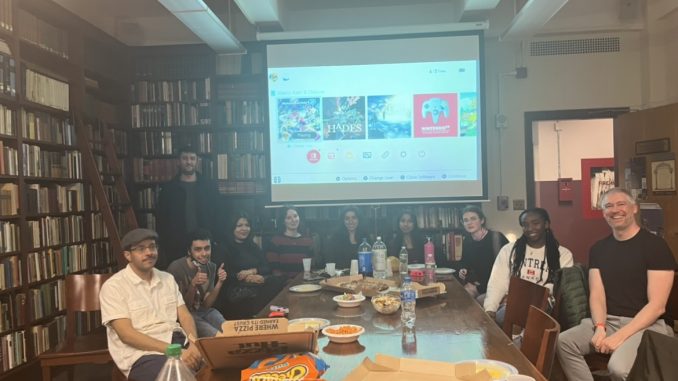
By Paulina Gajewski
The Classics Department held a gaming event in the Costas Classics Library, where students traversed to the mythical realm of the underworld, battling over the video game “Hades,” accompanied with food and great company. The gathering on Tuesday, Apr. 25, allowed attendees and professors to provide great insights into the department and its goals.
The game of “Hades” utilizes narrative storytelling as the player takes on the role of Zagreus, son of Hades, who attempts to escape to the mortal realm. The game used classical mythology to inform its plots and characters, and the event was a great way of tying entertainment to the topics and conversations often present in lectures.
The students who attended represented a variety of departments across campus, who either enjoyed their classics classes or decided to pursue a minor in the topic.
Jesse Irizarry, who is pursuing a B.F.A. in Art, remarked that he enjoyed the “chance to wind down and meet new people.”
Classics can be enjoyed by anyone regardless of their pursuits. Felix Filozov, who double majors in math along with classics, said, “I enjoy learning about classics because of the history of mathematical and scientific innovations.”
The amount of majors and minors in the department is constantly shifting, having periods of stagnation, punctuated by periods of growth. Historically, there has been an ebb and flow in the numbers of majors and minors.
“When I arrived in 2010, we had as many majors and minors as we currently do,” said Classics Professor Brian Sowers. “The college currently is encouraging more students to declare minors. We’re currently in a leaner season.”
The Classics Department is not alone in this recruiting issue, as Sowers noted that students’ decision to pursue humanities could be a reflection of cultural values.
“My impression is that the way that students have been choosing their field of study has changed over the years, and I think probably within the last five years, the humanities has had a difficult time recruiting students. It’s not unique to classics, it’s a national trend,” Sowers said. “We’re at a point in time where education is severely undervalued.”
Brooklyn College is known to many as a commuter school, as are most CUNY institutions. From a variety of working class households, the campus is often viewed solely as a place to attend classes. Events like these hosted across departments aim to foster a community that breaks the stigma around commuter schools and helps to build strong relationships between students.
“My main objective is to spend time together because the pandemic really prevented us from doing that,” said Sowers. “There should be spaces that allow students to be present on campus, where you’re actually doing something rather than just buying time. This is all connected to what a university experience should be about.”
The faculty in the Classics Department aim to host similar events and expand their reach to new students. Classics Professor Philip Thibodeau stated that the department has reached out to Brooklyn Latin High School in an attempt to garner interest. Students from the school, who already learn Latin and are exposed to the classical world, will visit Brooklyn College on field trips, and Brooklyn College faculty will, in return, visit them and give presentations. The hope is to channel dozens of students into the classics programs.
Changes in the personnel of the department have also provided extra challenges. “We used to have around nine faculty members. Now we have about five,” Thibodeau said. “The real change in the department, across the different schools in the humanities, is that the college hasn’t hired replacements for people who have left or retired.”
Thibodeau emphasized the efforts in the Classics Department to engage new students. A decent number of pathways classes available to students are classics classes, which the professors utilize to funnel students into further pursuing the classes. The department also collaborates with studies in premodern history and philosophy to provide Late-Antique-Medieval-Early-Modern (LAMEM) lectures.
“We don’t necessarily have more resources, but we do have resources here that we are not arranging in the most efficient way possible,” Thibodeau told The Vanguard.
Perhaps the issue may also lie in the way classics are presented to students. The professors attested to the importance of classics in our modern world.
“The world we live in is informed by the ancient world,” said Sowers. “Classics has the ability to create students who are able to think critically about the world they live in. It is unique because it is interdisciplinary.”
Professors are constantly asserting connections to contemporary ideologies in order to provide relevance to topics. “I’ve turned a lot of the syllabus and content of my mythology classes in order to explore very sensitive contemporary issues, such as those of sexuality, representations of non-Greeks and Romans in Greco-Roman culture, to the emergence of the ideology of masculinity,” said Thibodeau.
The event hosted by the Classics Department was just a glimpse at the types of events the faculty hopes to hold in future semesters to create a welcoming community for students.
